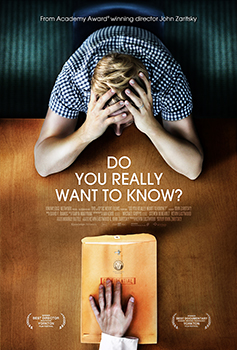Do You Really Want to Know?
Do You Really Want to Know? |
|
|---|---|
| Language | English |
Do You Really Want to Know? is a book that explores the ethical, psychological, and social implications of genetic testing and genetic counseling. The book delves into the complexities of knowing one's genetic predispositions to various diseases and conditions, and the impact this knowledge can have on individuals and their families.
Overview[edit | edit source]
The book is structured to provide a comprehensive understanding of the various aspects of genetic testing. It includes real-life case studies, expert opinions, and discussions on the latest advancements in genomics and biotechnology. The narrative aims to present a balanced view, highlighting both the potential benefits and the ethical dilemmas associated with genetic information.
Key Themes[edit | edit source]
Ethical Considerations[edit | edit source]
One of the primary themes of the book is the ethical considerations surrounding genetic testing. It discusses issues such as informed consent, privacy, and the potential for genetic discrimination. The book also explores the moral responsibilities of healthcare providers in delivering genetic information.
Psychological Impact[edit | edit source]
The psychological impact of knowing one's genetic risks is another significant theme. The book examines how individuals cope with the knowledge of being predisposed to certain conditions, such as Huntington's disease, Alzheimer's disease, and various forms of cancer. It also looks at the role of genetic counseling in helping individuals understand and manage their genetic information.
Social Implications[edit | edit source]
The social implications of genetic testing are also thoroughly explored. The book discusses how genetic information can affect family dynamics, relationships, and even social structures. It raises questions about the potential for a new form of social stratification based on genetic information.
Case Studies[edit | edit source]
The book includes several case studies that illustrate the real-world applications and consequences of genetic testing. These case studies provide a human perspective on the scientific and ethical issues discussed in the book.
Conclusion[edit | edit source]
In conclusion, Do You Really Want to Know? serves as a thought-provoking examination of the rapidly evolving field of genetic testing. It encourages readers to consider the profound implications of having access to their genetic information and to weigh the benefits against the potential risks.
See Also[edit | edit source]
- Genetic testing
- Genetic counseling
- Genomics
- Biotechnology
- Informed consent
- Privacy
- Genetic discrimination
- Huntington's disease
- Alzheimer's disease
- Cancer
References[edit | edit source]
External Links[edit | edit source]
Search WikiMD
Ad.Tired of being Overweight? Try W8MD's physician weight loss program.
Semaglutide (Ozempic / Wegovy and Tirzepatide (Mounjaro / Zepbound) available.
Advertise on WikiMD
|
WikiMD's Wellness Encyclopedia |
| Let Food Be Thy Medicine Medicine Thy Food - Hippocrates |
Translate this page: - East Asian
中文,
日本,
한국어,
South Asian
हिन्दी,
தமிழ்,
తెలుగు,
Urdu,
ಕನ್ನಡ,
Southeast Asian
Indonesian,
Vietnamese,
Thai,
မြန်မာဘာသာ,
বাংলা
European
español,
Deutsch,
français,
Greek,
português do Brasil,
polski,
română,
русский,
Nederlands,
norsk,
svenska,
suomi,
Italian
Middle Eastern & African
عربى,
Turkish,
Persian,
Hebrew,
Afrikaans,
isiZulu,
Kiswahili,
Other
Bulgarian,
Hungarian,
Czech,
Swedish,
മലയാളം,
मराठी,
ਪੰਜਾਬੀ,
ગુજરાતી,
Portuguese,
Ukrainian
Medical Disclaimer: WikiMD is not a substitute for professional medical advice. The information on WikiMD is provided as an information resource only, may be incorrect, outdated or misleading, and is not to be used or relied on for any diagnostic or treatment purposes. Please consult your health care provider before making any healthcare decisions or for guidance about a specific medical condition. WikiMD expressly disclaims responsibility, and shall have no liability, for any damages, loss, injury, or liability whatsoever suffered as a result of your reliance on the information contained in this site. By visiting this site you agree to the foregoing terms and conditions, which may from time to time be changed or supplemented by WikiMD. If you do not agree to the foregoing terms and conditions, you should not enter or use this site. See full disclaimer.
Credits:Most images are courtesy of Wikimedia commons, and templates Wikipedia, licensed under CC BY SA or similar.
Contributors: Prab R. Tumpati, MD

